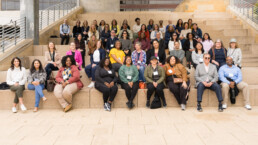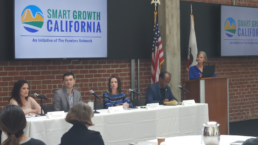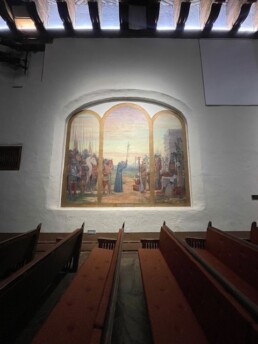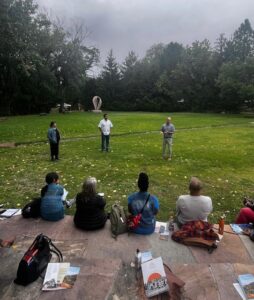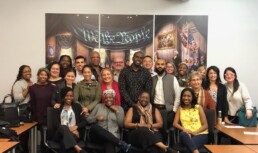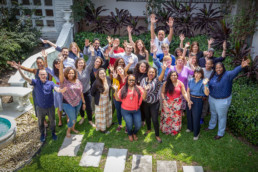Going PLACES: We All We Got — Powering Up the Margins for Self-Determination
BY Qiana Williams, PLACES Fellow and Program Officer, Central New York Community Foundation
“We All We Got,” was boldly written in black letters against the backdrop of a warm yellow wall in the reception area of the Village of Healing Center of Cleveland, Ohio. This community-based organization provides high-quality health and healing services for Black and brown women with dignity, attentiveness and cultural understanding. The warm yellow wall we were greeted with reminded me of the golden yellow used to represent the Yoruba orisha Oshun, the African goddess of fresh water, creativity, love and life. Many within the African diaspora carried her over to the “New World,” and to many descendants of the African diaspora she is a symbol of hope.
And hope is what I felt when I entered the Village of Healing Center, our third stop on the PLACES Fellowship journey of 2024.
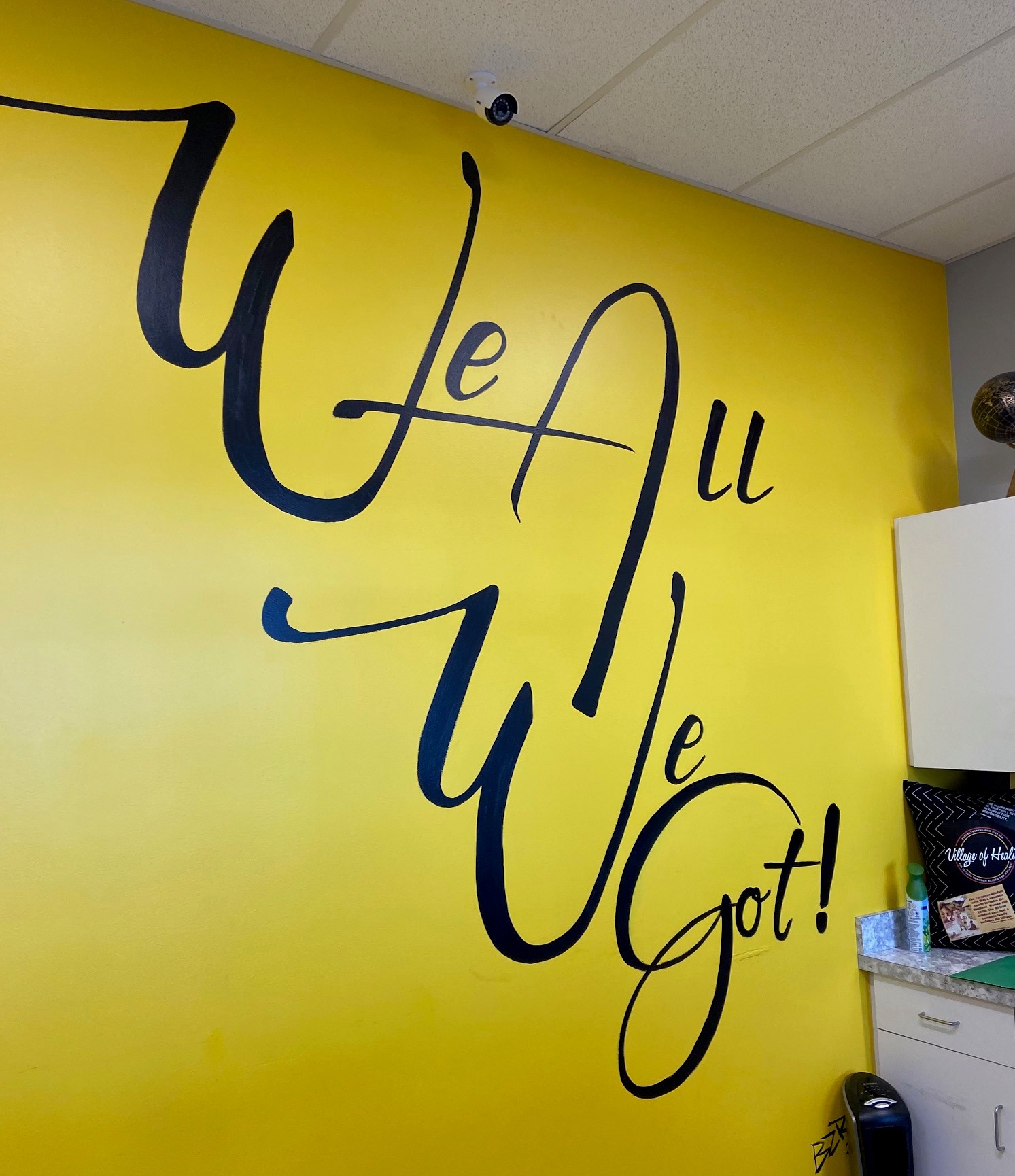
Photo Credit: Qiana Williams
We were immediately greeted with food, generosity and, most vital of all, knowledge and wisdom of what Black women leadership, when fully resourced, looks like. As we moved into the meeting space, we were surrounded with powerful uplifting messages reminding us of the urgency and the call to action we all need to heed to address the evils of systemic racism.
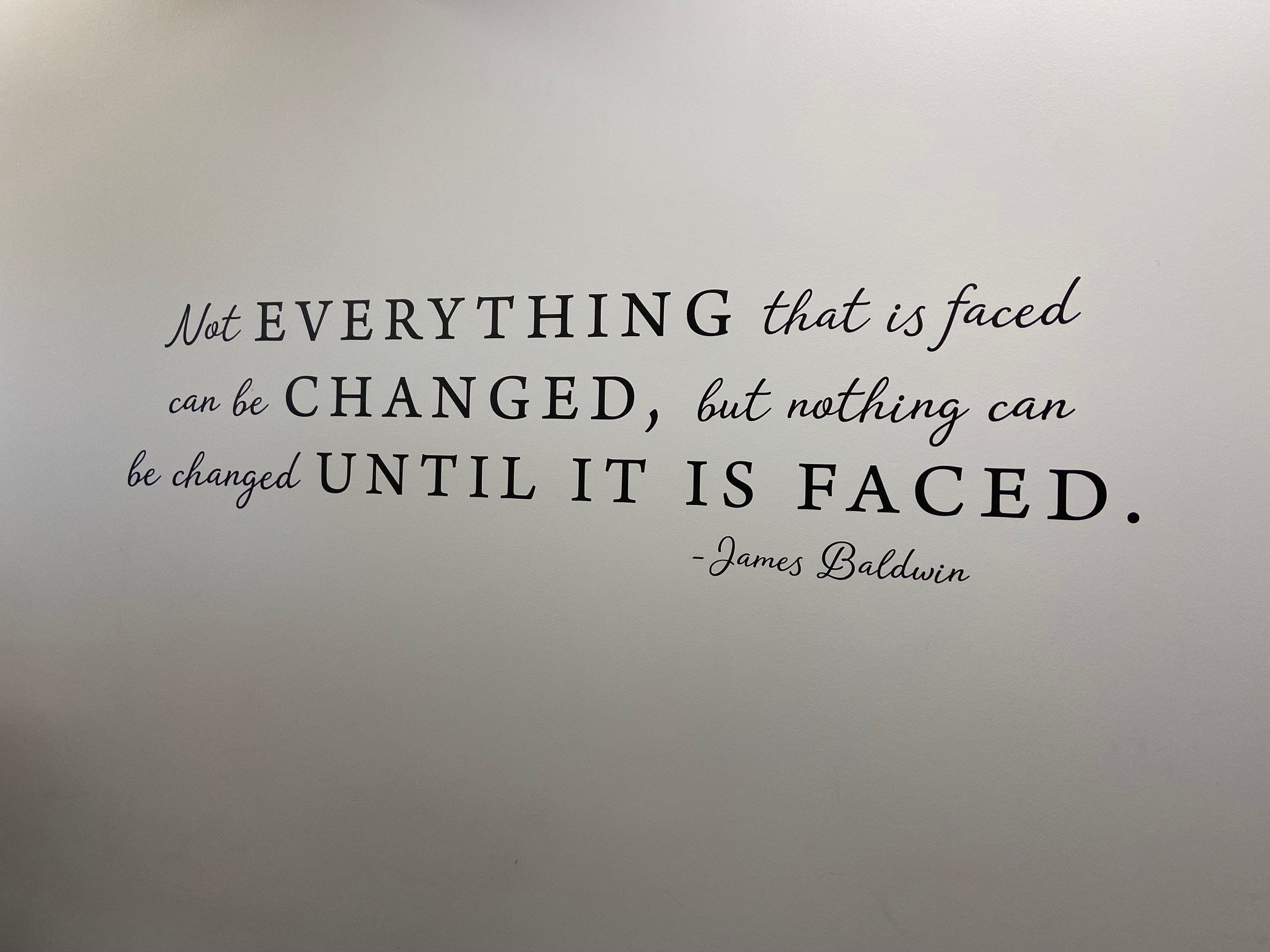
Photo Credit: Qiana Williams
The Village of Healing Center in Cleveland was born from the sheer will of several Black women trying to address the gross disparities and inequities in healthcare for Black and brown people. Launched in 2019 prior to the pandemic, the Village of Healing Center began building high-quality healthcare services and community programs with Black healthcare professionals. They offer programs that not only address health, but also take a holistic approach to healing. Programs such as Mother to Mother and Sister Circle focus on community building. The Village of Healing Center provides services to more than 700 Black and brown women.
Like all inventive Black women leaders, this vital work is done in partnership with others, such as Birthing Beautiful Communities — a community-based organization (CBO) led by Black woman that has served more than 600 clients and trained more than 75 women as perinatal support professionals, combating the social determinants that lead to poor birth outcomes. To strengthen support for this work and to bring awareness to the disproportionately high rates of mortality for Black women, both of these CBOs work in tandem with Enlightened Solutions — a nonprofit think tank led by two women (one who is Black and one who is white) that uses data to strategically address inequity and systemic injustice.
“Those who live in the attic know where the roof leaks.”
- Ibo proverb
As this intersectional, passionate panel shared their story of how they came together to do this powerful work, it was evident that if we funders want to be changemakers and power brokers for equity, then the most important thing we can ask is “What does the community need and how do I heed?”
To “center the margins” as Patricia Hill Collins challenges us to do in systems of oppression, we must listen to those closest to the issues as therein lies the solutions. These women leaders felt that it was more important to fight their own battle rather than asking for allies. Having walked that long, lonely road to allyship, they knew all too well that the best way to create the change that was needed was to lean on each other. They knew no one would understand better than them how to solve these critical issues. As their work radiated out, it attracted funders and donors who understood its urgency and made the investment. But, the good work is never done and true allyship for community-based organizations like these means building trust-based relationships. It means making it so that they don’t have to go it alone. It means making the investment of time, talent and dollars. The work of organizations like these may be in jeopardy as we recently learned of the court of appeals ruling in the Fearless Fund case.
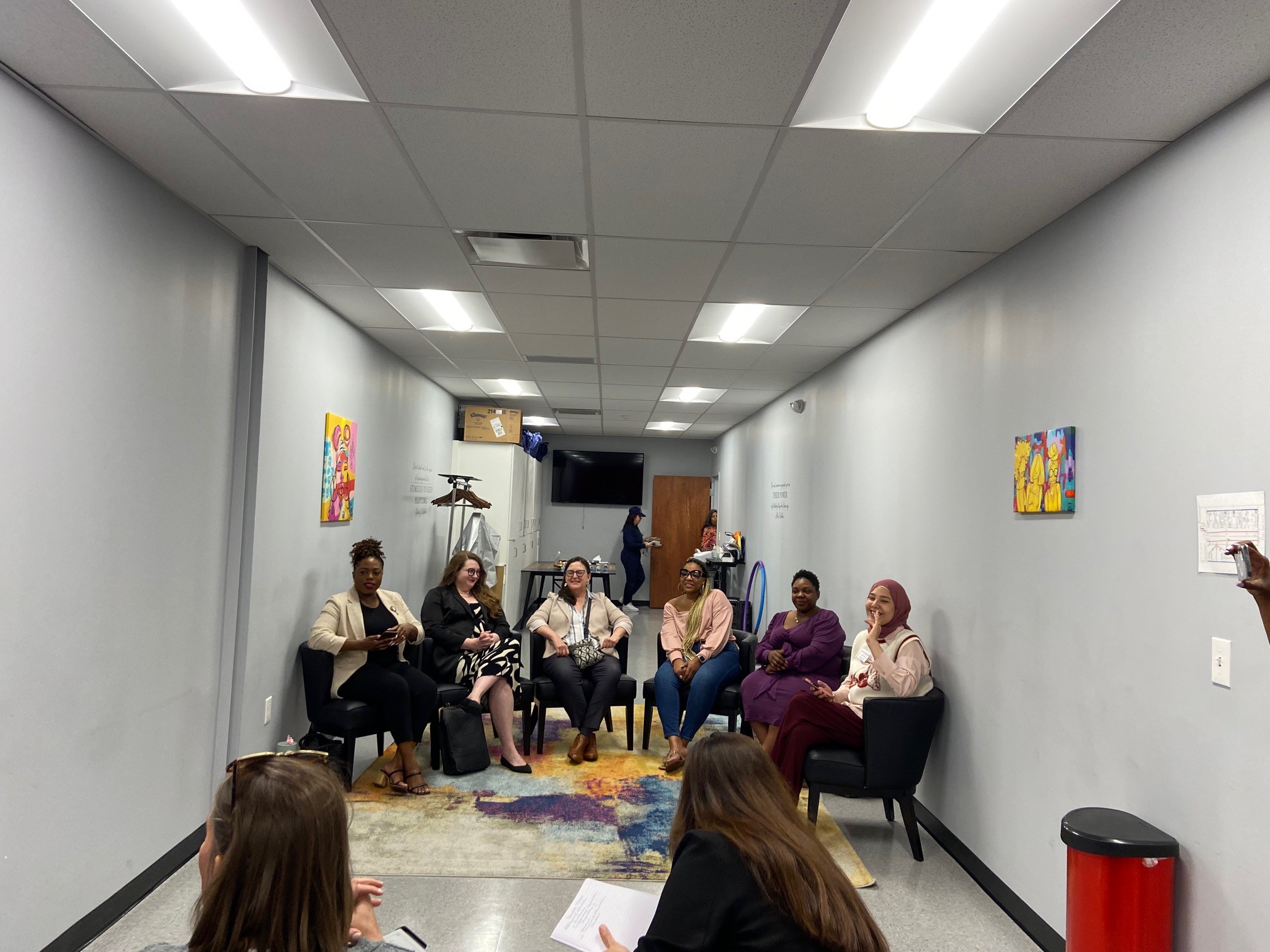
Panel at Village of Healing Center. From left to right: Chinenye Nkemere, Bethany Studenic,
Christie Manning, Da’na Langford, Jazmin Long and Talissa Lahaliyed.
Photo Credit: Qiana Williams
It impressed upon me and all of us working in philanthropy that retreat is not an option! It is never an option. That liberatory work, as the PLACES mentor Bina M. Patel passionately conveys, must continually seek to disrupt oppression. We as funders need to creatively and strategically leverage our power and privilege to ramp up the work of organizations like the Village of Healing Center if we want to see community transformation and if we are to stay true to anti-racist work.
Three poignant key takeaways that the panel shared with us were:
- Try new solutions — don’t be afraid to take risks and support impactful innovative work
- Implement emergent design and co-design — talk to those in the metaphorical attic, collaborate, “scheme and dream” to find the solutions, and get out into the community
- Provide more multi-year operational funding — the only way we can know if it’s working is to give time to sow the seeds.
Funders don’t have to practice all of the above in any particular order, but we do have a responsibility to find a way to disrupt the same systemic outcomes. We have a responsibility to power up resource leaders and communities on the margins for success and for self-determination. As they say, put our money where our mouth is!
I walked away from this day feeling deeply inspired with the hope that I will continue my commitment as a changemaker to create and support self-determination for those who have been historically disinvested. I will do this through community building and trust-based relationships.
For me, these amazing Black women leaders of the Village of Healing Center, the Birthing Beautiful Communities and Enlightened Solutions embody the creativity, life and love of the Yoruba goddess Oshun, and like Oshun they are harnessing hope for an entire generation.
About the Author
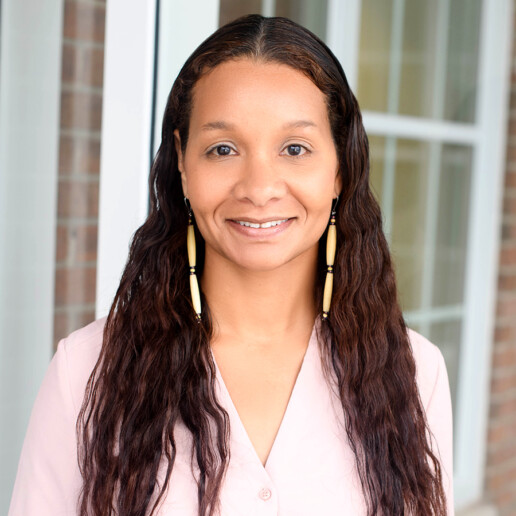 Qiana Williams is a program officer at the Central New York Community Foundation, working directly with community residents and nonprofit staff to assist in the design and implementation of the Community Foundation’s strategic initiatives and grantmaking. Qiana is a member of TFN's 2024 PLACES Fellowship cohort.
Qiana Williams is a program officer at the Central New York Community Foundation, working directly with community residents and nonprofit staff to assist in the design and implementation of the Community Foundation’s strategic initiatives and grantmaking. Qiana is a member of TFN's 2024 PLACES Fellowship cohort.
I’m tired of the gaslighting. Aren’t you?
Reflections on Juneteenth, the Fearless Fund decision and the survivors of the Tulsa Race Massacre.
BY Dion Cartwright, TFN President & CEO
Anger and disgust.
That was my initial reaction to a recent federal appeals court decision to block the Fearless Fund and its grant program for Black female entrepreneurs.
The Fearless Fund, founded and operated by women of color, is a venture capital firm that exclusively invests in tech and consumer-goods companies owned by women of color. In 2022, women of color business founders received just 0.39% of the $288 billion that venture capital firms deployed – a sobering statistic that underscores the critical need for initiatives like the Fearless Fund. This ruling is the latest blow of a larger, concerted effort to undo decades of progress for racially marginalized communities.
It’s telling that the lawsuit claiming the Georgia-based Fearless Fund is "racially discriminatory” was spearheaded by the same legal strategist behind the Supreme Court case that dismantled affirmative action in college admissions.
The Fearless Fund decision jeopardizes similar initiatives aimed at leveling the playing field for businesses owned by Black women and other people of color.
Like last year’s Supreme Court ruling, this is a disappointing setback celebrated by those who seek to unravel — or cynically subvert — American laws and policies originally designed to combat historic racial discrimination, oppression and violence.
Another recent court decision that is sitting heavy on my heart today is one that also sends a chilling message to advocates for racial justice.
On June 12, the Supreme Court of Oklahoma dismissed a lawsuit by the last known survivors of the 1921 Tulsa Race Massacre, rejecting requests for reparations for one of the most sickening incidents of racist violence against Black people in U.S. history.
This ruling will likely end the historic quest for justice by Lessie Benningfield Randle, 109, and Viola Ford Fletcher, 110, who were young children at the time. Fletcher’s younger brother, Hughes Van Ellis, was also a plaintiff in the suit. He died last year at the age of 102 after spending decades fighting to get compensation for the massacre — not just for himself, but for his community.
The survivors were seeking community benefits that included a detailed account of the property and wealth destroyed or stolen during the massacre, the construction of a hospital and the creation of a victim’s compensation fund. The Tulsa Historical Society and Museum provides an extensive resource collection of reports, archives, book recommendations, and I encourage you to explore these materials to gain a deeper understanding of this dark chapter in our history.
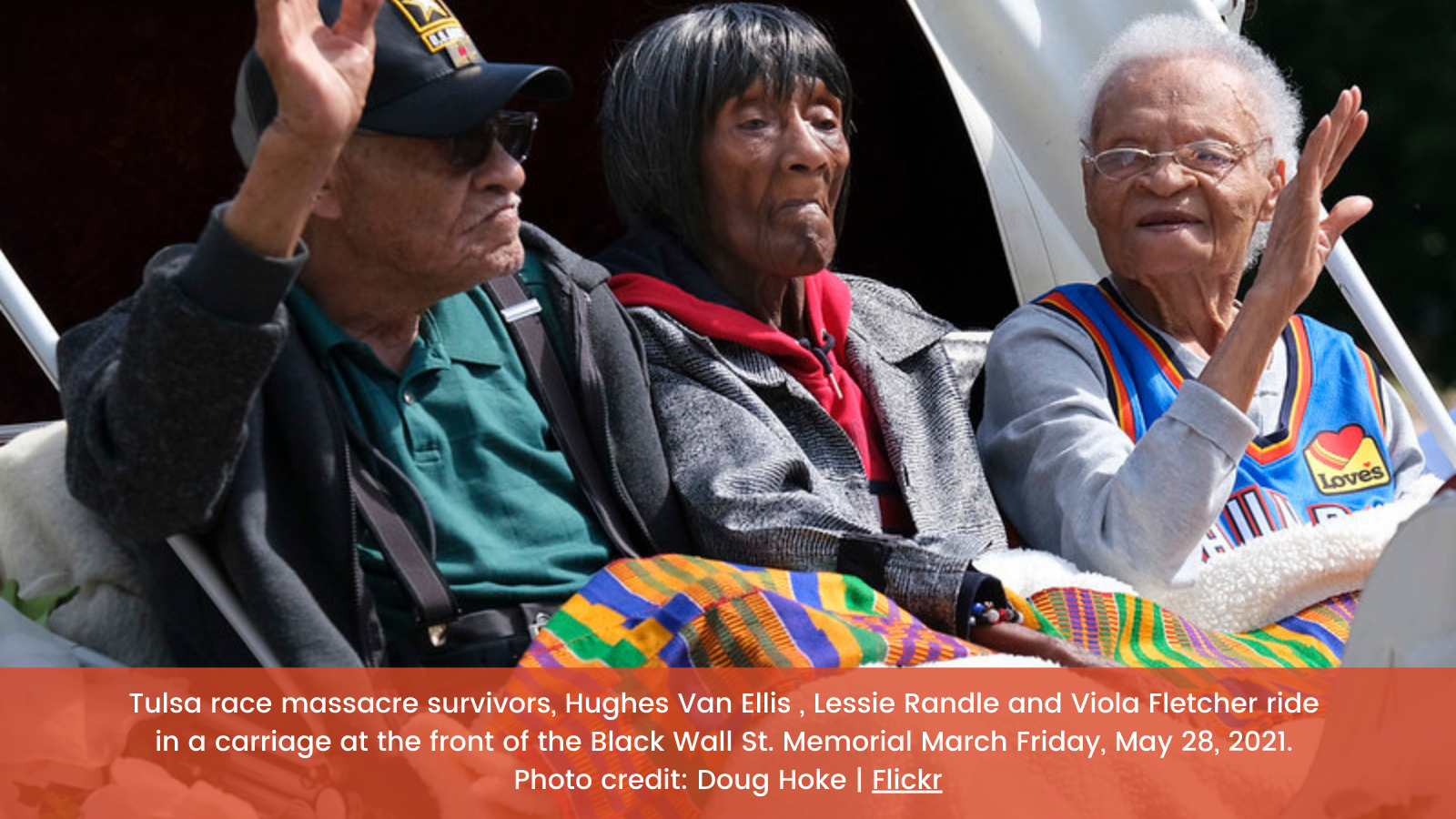
Reaffirming Our Commitments
The Freedom Fund decision and the Oklahoma ruling are two very different cases, rooted in events that happened more than a century apart. But they both represent efforts to diminish or outright ignore the impacts of historic injustice that have plagued Black and brown people for generations.
I am so tired of the gaslighting. Aren’t you?
This Wednesday is Juneteenth, a holiday that commemorates the true end of slavery in the U.S. It’s a day to honor the ancestors who survived the horrors of enslavement, and those who fought for our basic civil liberties under the shadow of Jim Crow.
It’s a day to reflect on how far we’ve come, and how far we have to go before achieving true liberation.
This Juneteenth, I want to reaffirm my commitment to advocating and disrupting for racial justice alongside my team at The Funders Network and many of you.
We recognize the humanity and dignity of all marginalized peoples and are committed to amplifying the expertise and experiences of those communities who are least heard.
We’re committed to implementing the strategies laid out in TFN’s Racial Equity Framework and holding ourselves accountable to ourselves and our members.
That includes working with the philanthropic sector to truly understand the ways systemic racism and other forms of oppression continue to impact our world.
We’re committed to helping our members and allies acquire the tools and practices to apply that understanding to their own grantmaking and community engagement practices.
Reclaiming Our Past, Safeguarding Our Future
TFN’s members are a diverse group of funders with a wide array of focus areas. But connecting us all is a desire to help create communities and regions that are sustainable, prosperous and just for all.
We need bold philanthropic leadership if we’re going to make that vision a reality.
As we face these ongoing assaults on the values of diversity, equity and inclusion — and find ourselves in yet another high-stakes election season — I encourage our members to flex their advocacy muscles. Talk about the issues communities are facing and amplify the voices of those least heard and ignored.
On Monday, I joined Bolder Advocacy’s program director, Natalie Roetzel Ossenfort, for a TFN webinar aimed at funders who may be hesitant to step into the political arena.
If you were unable to join us, please check out Natalie’s blog post which includes resources on election season advocacy for you and your foundations.
Philanthropic leaders must also be intentional in supporting the storytellers, truth-seekers and culture-keepers in our communities. They are a powerful weapon against ongoing injustice and a critical defense against efforts to erase our histories.
The Tulsa Race Massacre is a tragic example of how silence can be as sinister as violence.
The massacre began when a white mob descended on the prosperous Greenwood neighborhood, home to what was known then as “Black Wall Street.” They shot Black people indiscriminately and burned more than 1,000 homes and hundreds of Black-owned businesses. Historians estimate as many as 300 Black people were killed, and archeologists are still examining unmarked graves to further identify victims and their descendants.
No one was ever arrested or charged in the massacre. And city and civic leaders in Tulsa deliberately ignored and covered up what had happened for decades.
The Oklahoma ruling discredits the pain of the past, just as the Fearless Fund decision threatens our future. I’m still angry and disgusted by these headlines. But I’m also inspired by these three Tulsa centenarians who refused to be silenced. I’m even more determined to step up and speak out.
I hope you’ll join me.
A Broader Vision of Biking: Lessons from Paris
BY Martha Roskowski, TFN's Mobility and Access Collaborative
I am a fan of study tours. There is magic in immersing a group of leaders in a place, watching them learn about policies and approaches, then helping them sort through what is most relevant to their situation and bring the ideas back home.
In recent years, I helped lead groups of funders studying mode shift, electrification and congestion pricing in London, Amsterdam and Stockholm. While at PeopleForBikes, I helped shepherd more than 300 elected officials, city staff, advocates, funders and community leaders on tours in the Netherlands and Denmark.
Lured by stories of a rapid rise in people riding bikes in Paris, I visited in fall 2023 to evaluate the lessons the city might teach U.S. leaders. My transportation geek friends are abuzz about the numbers. LeMonde newspaper reported that bicycling in Paris doubled between October 2022 and a year later. The city’s own report from 2021 to 2022 found an impressive 3% growth in bike facilities, 18.9% growth in bike use, 2.5% reduction in car travel and 16% fewer fatal crashes.

I recruited a study tour expert to join me on the exploration. Dr. Meredith Glaser of the Urban Cycling Institute wrote her PhD thesis on reshaping urban transport policy. Along with Lauren Ghidotti, an Urban Cycling Institute intern, we rode bikes, talked with local leaders and discussed our observations. We joined the rush hour crowd of locals biking to work or school, whizzing past car traffic. My unofficial counts found nearly as many women riding as men and two-thirds of riders without helmets, both indicators of perceived safety.
Paris is not like most U.S. cities. It is very dense, with 56,000 people per square mile, more than twice NYC’s 27,000 per square mile. The street network was established before the automobile. They didn’t bisect the center of their city with interstate highways. A robust transit system and a culture of walking mean many within the city live car-free. Many of the drivers angry about the transformation live in the suburbs so do not vote in Paris elections. And yet, many lessons from Paris are transferable to the US context, including:
- Elect a visionary mayor who can maneuver through complex governance: I posit that a courageous mayor is the single most important factor in a city making significant progress on biking. In France, Mayors hold unilateral administrative and executive power, with a 6-year mandate. Mayor Anne Hidalgo campaigned for re-election on a promise to complete the bike network. She won in 2020 with 20% more votes than her nearest challenger. She strategically appointed smart (and female) transport directors who embraced her vision. Most U.S. cities have plans on the shelf and committed staff who just await the political charge to get the designs on the ground.
- Have an ambitious plan: Following the re-election of Mayor Hidalgo, the city rolled out Plan Velo: Act 2, an updated plan promising 350 km of new bike lanes and 300 school streets by 2026. In 2019, a Collectif of organizations, agencies and individuals proposed an ambitious bike network for the broader Paris region. The plan, Réseau Vélo Île-de-France, has been embraced by the regional government with commitments of €500 million to help build out 750 km of express cycle routes.

- Embrace opportunity: As host of the 2024 Summer Olympics, meeting the mobility needs of 15M visitors in a city of just over 2M residents included accelerating bike plan implementation. Every U.S. city planning for major events (hello, Los Angeles) could look to Paris for lessons on rapid response to new demands. When the city went into lockdown for COVID-19, staff raced to retrofit streets to prepare for socially distanced travel in a city heavily reliant on the Métro. As the end of lockdown approached, city leaders chose to limit private vehicles on Rue de Rivoli, making it the premiere east-west bike corridor through the heart of the city. Frequent transit strikes inspire people to adopt more reliable and individual transport options.
- Embed biking in a broader vision: Plans for biking live within a comprehensive transportation system of walking, buses, subways, trains and vehicles. Biking supports broader plans to improve air quality, build the 15-minute city and expand social housing. Paris’s robust climate action plan promises to plant 100,000 trees, install more solar, retrofit buildings and clean up the water of the Seine.
- Show rather than ask: In 2014, cars were banned from the Left Bank of the Seine River. Short summertime closures of the expressway on the Right Bank became a 6-month pilot in 2016. The resulting popularity and leadership by the city led to the permanent closure of both banks in 2017. Despite protests from suburban drivers and concerns of gridlock (spoiler: didn’t happen) the banks of the Seine are now a linear celebration of biking, walking, beaches, music and public life. The short-term pilots built public support for the bigger moves.
- Build a bike culture through education and partnerships: We got the impression that agencies work more closely with non-profits than in the U.S. The City of Paris supports associations that help immigrant women learn to ride bikes and provides free office space to the grassroots group MDB in return for providing cycling information. The Collectif includes regional governments that fund the organization that advocates for better biking. As advocacy groups in the U.S. rely on foundations, events and membership for funding, adding a dose of public funding is worth exploring.

- Aim for good enough: Paris’s network lacks the connectivity of Dutch cities where every road provides comfortable facilities for bikes. But the network in Paris is safe enough, connected enough and convenient enough that it passes the simple test - people are using it. One local described the system as “like jazz, with lots of improv.” Protected one-way and two-way bike lanes might shift to a few blocks of older painted lanes or shared pathways in the center of boulevards. Facilities sometimes end at the big plazas and then pick back up on the other side. It worked for me, a cautious rider, as long as I followed the green lines on the map. Traffic moves slowly and there are enough bikes that drivers expect us.
- Delight in the details: The bureau in charge of architectural consistency decreed that granite blocks would be used as bike facility separators. They are far more pleasing and durable (albeit expensive) than our ubiquitous plastic posts. The signs and signals engineers are figuring out how to move bikers, pedestrians and drivers with consistency. At a complex five-way intersection near Pere-Lachaise cemetery, I sat at a sidewalk cafe and counted 29 newly installed concrete bulb-outs, diverters and refuge islands that guide bikers.
- Bikeshare can work: In 2022, 25% of trips by bike in Paris were made on the Velíb bikeshare system. I found it to be generally reliable despite spotty maintenance. With 19,000 bikes at 1464 stations, a bike is usually nearby. The one time I couldn’t find a usable bike within a few blocks, I just trotted to a nearby Métro station. I preferred the e-bikes, which make up about 40% of the fleet, so I could start quickly at intersections, keep up with traffic and climb the occasional hill without sweating.
- Remove parking and improve the walking experience: Paris is a parking reformer’s dream. The city is removing 70,000 on-street parking spaces —about half of the supply — to make space for two things: bikes and trees. While earlier designs painted bike lanes on sidewalks, more recent iterations are using space previously devoted to cars for bike infrastructure, returning sidewalks to people walking and streetside cafes. During our visit in October 2023, Paris had just started charging motorcycles to park on city streets, and in March 2025, voters approved a measure to triple the parking fees for large SUVs.

While there are many lessons from Paris, their work on including diversity, equity and inclusion in transportation planning seems less intentional than ours. On past European tours, delegates grilled local leaders on how they prioritize and measure social equity and racial justice in transportation planning. The answers usually left U.S. delegates unsatisfied. Our conversations in Paris were no different. To better understand the dynamics around immigration, racism, poverty, underrepresentation and civil unrest in France, we’ll need to reach beyond the transportation field to find experts, including academics and those with lived experience, who can tell the stories.
Meredith, Lauren and I concluded that study tours of biking in Paris would be valuable for U.S. leaders. A cadre of agency staff, advocates, community leaders and consultants are ready to tell the story. With careful route choice, we’d feel comfortable leading delegates around the city on bikes. The sheer joy of experiencing a city by bike is a powerful incentive to make change back home, but as Meredith notes, “Riding a bike on study tours is only one part of the experiential learning equation — what also matters is the quality of intentional conversations about change that lead to knowledge transfer. This means that beyond expert Paris-based speakers, we need skilled facilitators who can “broker” the dialogue and spur creative thought processes among the delegates.”

Our usual model is delegations of 10 to 20 leaders visiting for a week, with days split between learning from experts, experiencing the city by bike and talking among ourselves to digest the learnings and make plans for progress back home. The model works, but it’s labor intensive and the reach is limited. Meredith and I brainstormed new models that might scale better without overtaxing the limited time of our gracious local hosts. We’re happy to discuss tour possibilities with anyone interested. And if a visit to Paris isn’t feasible, the video library of Streetfilms is the next best thing.
I am also exploring a funder study tour looking at transportation and resilience in Japan in May of 2025 on behalf of TFN. If you’re interested in learning more, please reach out at martha@fundersnetwork.org.
About the Mobility and Access Collaborative
The Mobility Fund was conceived and is guided by the Mobility and Access Collaborative, an initiative of The Funders Network. The collaborative is working to reduce transportation related greenhouse gas emissions while eliminating the underlying historic and current inequities in the mobility system. The collaborative is led by a core group of regional, place-based and national volunteers who are shaping and guiding work on transportation, including funders from the Barr Foundation, The Bullitt Foundation, Energy Foundation, Jacob and Terese Hershey Foundation, TransitCenter, The George Gund Foundation, The Joyce Foundation and The Summit Foundation.
--
About the Author
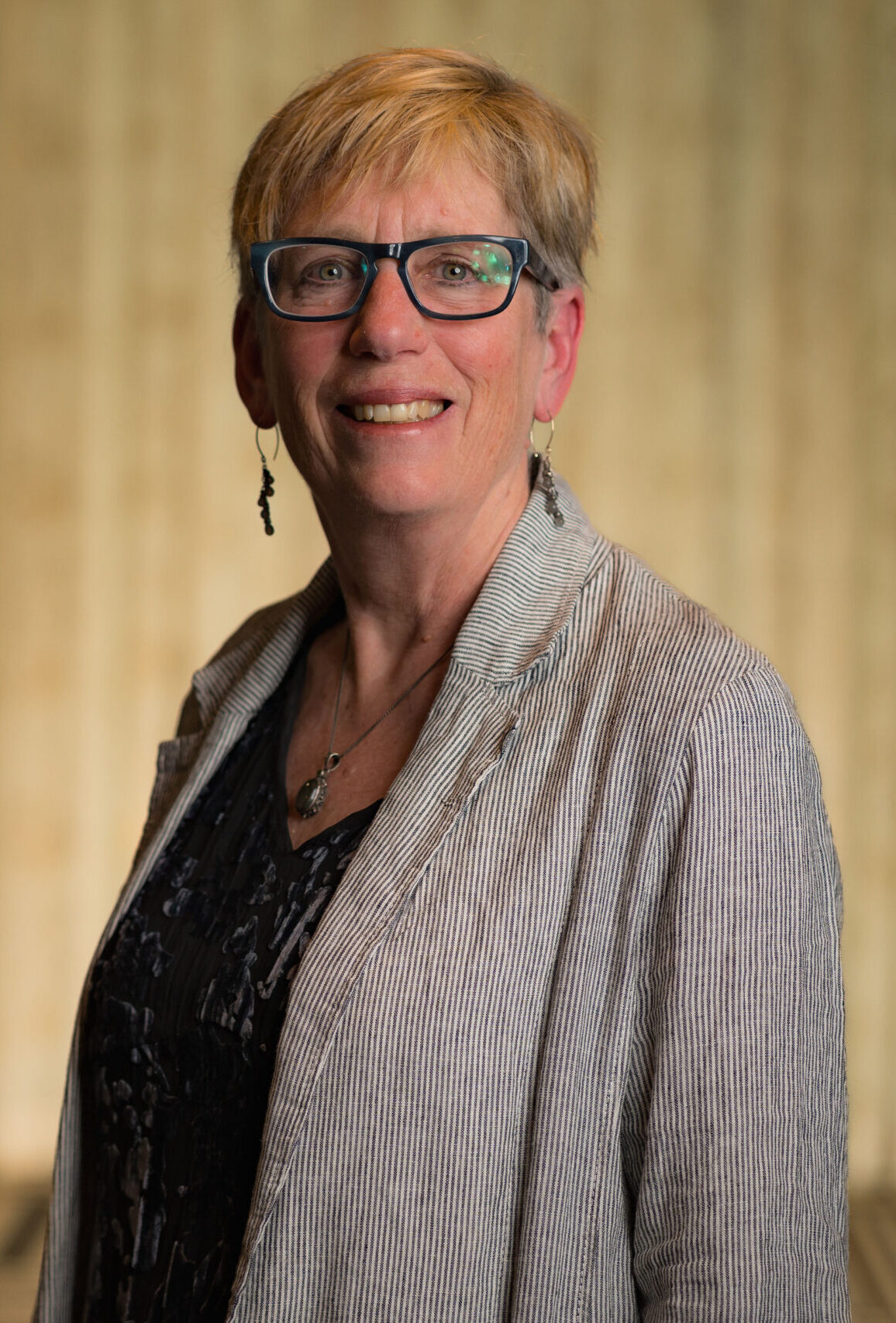
Martha Roskowski is the program lead for the Mobility and Access Collaborative, an initiative of The Funders Network. She is the founder of Further Strategies, a consulting firm based on Boulder, Col.
Ready, Set, Vote!
BY Natalie Roetzel Ossenfort, Program Director, AFJ Bolder Advocacy
It’s 2024, and you know what that means. It’s election season! Later this year, voters will take to the polls to determine who will lead our country, represent us in Congress and govern our cities and states.
In many places, they’ll also have the opportunity to vote on judges, local school board members, other important public officials and critical ballot measures that are poised to lead to the adoption of new laws related to abortion access, increases to minimum wage, rent control and more.
So what role can foundations play in the lead-up to November?
Importantly, foundations can engage in nonpartisan get-out-the-vote (GOTV) and voter education campaigns. They can also provide critical funding to public charity grantees to support their efforts to ensure that every voice is heard at the polls and every vote is counted. While 501(c)(3)s of all types (including public and private foundations) are prohibited from supporting or opposing candidates for public office, that does not mean that funders should shy away during election season.
For over three decades, the Alliance for Justice’s Bolder Advocacy program has assisted thousands of nonprofits and foundations working to build grassroots power by growing both their understanding and pursuit of advocacy, including nonpartisan election season advocacy.
Given the high stakes of this year’s elections, we are pleased to join forces with The Funders Network and Health and Environmental Funders Network to host a June 17 webinar covering the conventions foundations need to know when funding and engaging in election-related activities.
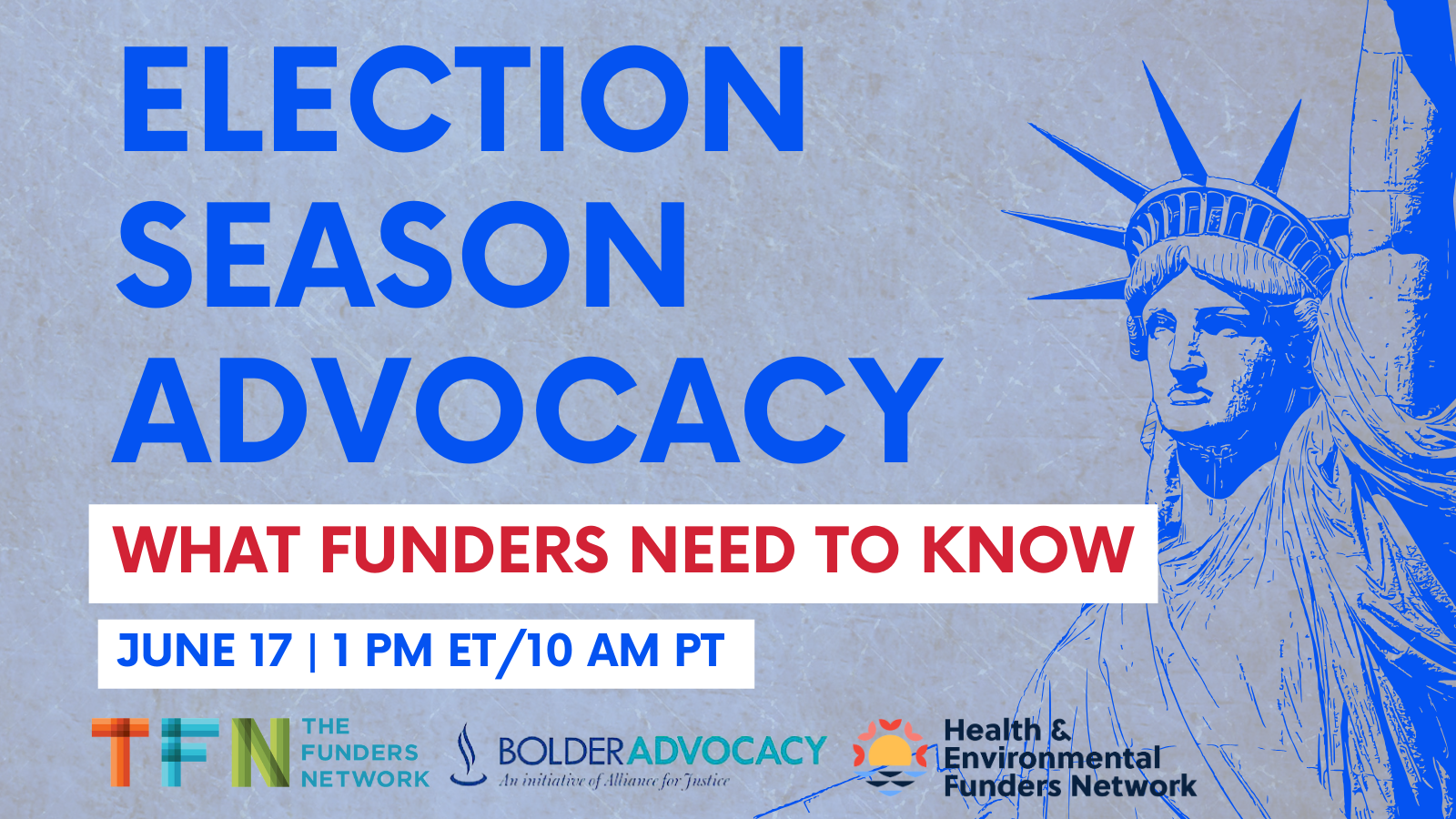
Click here to register!
During the session, we will discuss how foundations can provide critical support for nonpartisan election season activities, including special rules for private foundation voter registration grants. And, we’ll examine the many ways that foundations themselves can engage in voter education, candidate education and GOTV initiatives.
Can’t make it to the main event? Luckily, we have several resources to assist you and your foundation on your election season advocacy journey. If you still have questions after reviewing them, please feel free to reach out for technical assistance.
- Investing in Change: A Funder's Guide to Supporting Advocacy (includes discussions of election season advocacy and funding rules)
- Voter Registration Rules for Private Foundations | Factsheet
- Election Activities of Individuals Associated with Foundations | Factsheet
- Voter Engagement Messaging and Activities for Private Foundations
- Rules of the Game: A Guide to Election-Related Activities for 501(c)(3) Public Charities (including community foundations)
--
About the Author
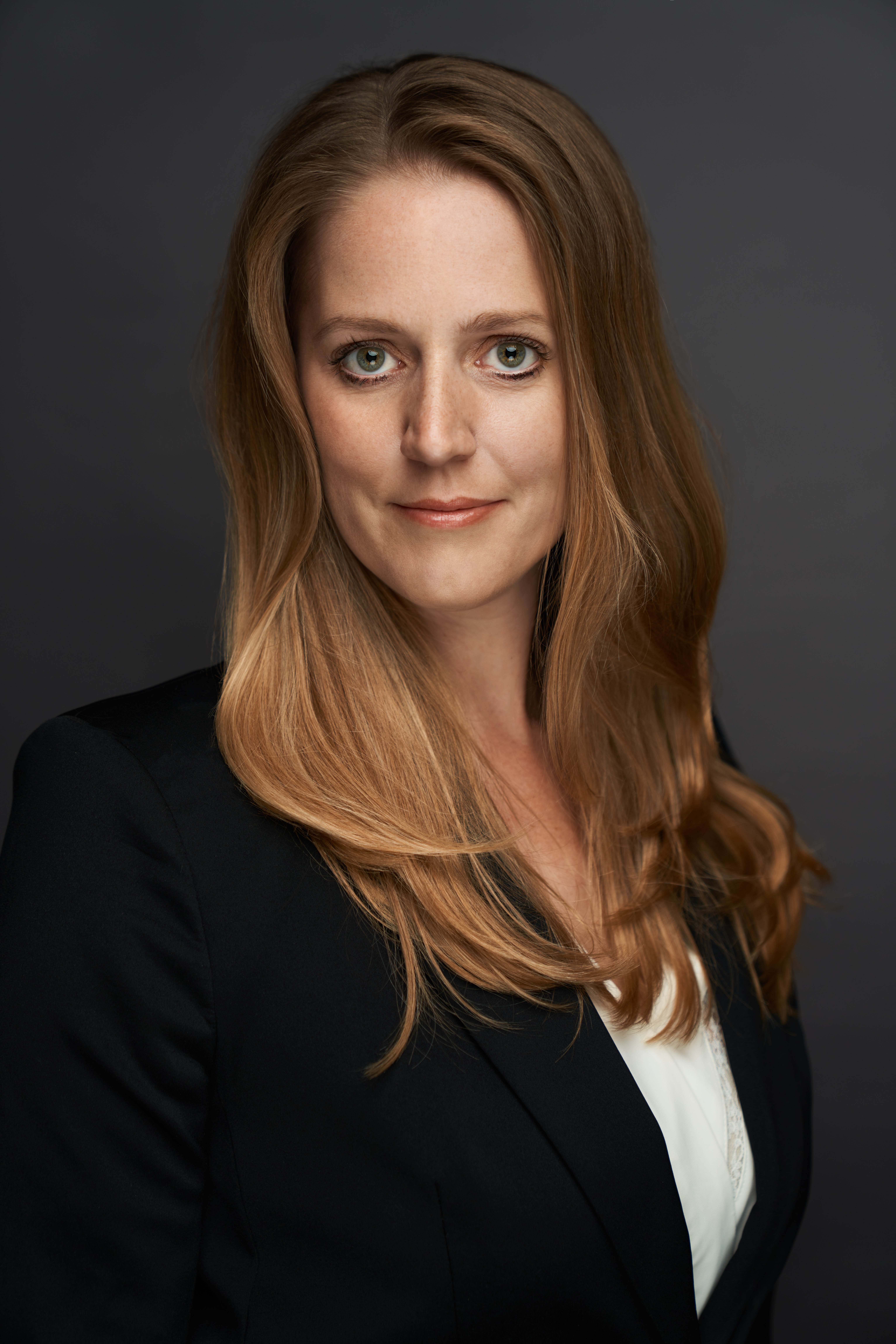
Natalie Ossenfort serves as Program Director for Bolder Advocacy, a program of Alliance for Justice.
Advancing Community, Climate and Connection: Key Takeaways from TFN's 2024 Spring Convening
BY Brooke McPherson, TFN Communications and Engagement Associate
I’ve been working with TFN now for more than six months, but it wasn’t until just a few weeks ago that I got to finally connect with my colleagues in person. Last month, I had the unique opportunity to travel to Austin, Texas to participate in TFN’s Spring Convening of the GREEN, Urban Water Funders and Mobility and Access Collaborative working groups.
The convening was the first time TFN had gathered these three working groups together, but between the enthusiasm for shared learning and the energy on our site visits, a newcomer like myself could have easily mistaken this for a family reunion.
The agenda was absolutely packed and covered a broad range of intersectional topics from water conservation efforts by the City of Austin to power building in politically hostile environments across the country. It was a lot to take in, and I’m still processing all I’ve learned weeks later. Here are some of my main takeaways from our time together in Austin:
Leading with Action
A central focus of the convening was the need for bold philanthropic leadership with a clear bias towards action, so it made sense that TFN should model what we preach.
It's been a longtime practice at TFN to open meetings with a land acknowledgement as a way of honoring the Indigenous peoples connected to the land we gather on. TFN’s President and CEO Dion Cartwright highlighted how Indigenous communities continue to see the worst impacts of the climate crisis yet only receive a sliver of philanthropic dollars. I was particularly excited to hear Dion introduce a new practice at TFN:
Whenever we hold any in-person event, TFN will make a donation to
a local Indigenous tribe or Indigenous-led organization.
For this gathering, TFN donated $1,000 to the Texas Tribal Buffalo Project, a non-profit that works to restore the traditional relationship between the Lipan Apache and the native Bison, providing the Indigenous communities of Texas a pathway to tribal and food sovereignty. You can learn about their important work here.
Money Talks; Let’s Amplify The Impact
Christopher Coes, assistant secretary for Transportation Policy for the U.S. Department of Transportation, joined us and shared his take on the transformative potential of philanthropy.
In this current era of massive government investment in infrastructure, environmental and clean energy projects across America, the conversation around philanthropic action is no longer a matter of “Can we do this?” Substantial, transformative change is happening across the country thanks to the work being accomplished by organizations large and small, so the real question now is “How can we do it better?”
Coe’s solution? Storytelling.
Success stories are an essential tool in justifying the new models that progressive policies are working to put in place. Effective storytelling brings the numbers behind reports to life, captures people and policymakers’ attention and can drive them to action.
As a member of the communications team here at TFN, I’m always keeping my eye out for ways we can amplify our funders’ work. After hearing from Coe, I’ve started thinking about social media less as a way of keeping folks informed and more as a catalyst for direct change.
TFN has partnered with the Health and Environmental Network and Neighborhood Funders Group on a joint effort to help funders connect their communities to federal dollars. This work is ongoing, and includes a round-up of resources and a downloadable “tip sheet” for funders. We’re also working on amplifying ways place-based foundations can help their communities access these historic federal investments and ensure those dollars get to those who need them most.
If you have any stories from your organization to share, don’t hesitate to reach out by emailing me at brookem@fundersnetwork.org.
Long-term Strategies in Politically Hostile Environments
Austin has long been considered a progressive center, in stark contrast to Texas’ otherwise highly conservative landscape. A lot of our conversations throughout the gathering focused on the hard-earned lessons from funders supporting those working on the frontlines in politically hostile environments.
We heard from funders investing in and testing a wide range of strategies to advance climate, transportation and water justice throughout conservative communities. They emphasized the need to look at the big picture and advocate for longterm, sustainable solutions to systemic issues instead of short-sighted, reactive policies.
The funder fishbowl discussion led by Dana Okano of the Hawaii Community Foundation, Elizabeth Love of the Jacob & Terese Hershey Foundation and John Mitterholzer of the George Gund Foundation particularly focused on the challenges of advancing equitable outcomes and countering conservative backlash. The conversation opened up to the entire room, inviting funders to jump in and share stories of strategies that are working and lessons learned from those that aren’t.
Doug Lewin, author of the Texas Energy and Power Newsletter and host of the Energy Capital Podcast, shared the ongoing efforts to increase wind and solar energy in Texas as a way of improving affordability, reliability, equity and sustainability across the state. He told us: “Think in terms of institutions, and think less in terms of one-off projects. Where there is project-based funding, ladder up to projects that don't end: organizing, civic engagement, communications, technical assistance.”
Learning from Place
Leading up to the Spring Convening, I was definitely most excited for the site visits. I’ve heard so much from funders and TFN staffers alike on how impactful and fun they can be, and how important it is to learn from place. I’ve been to Austin a few times before this trip so I was thrilled to see one of my favorite cities through a new lens that focused on the field leaders advancing climate, water and transportation justice.
And boy did we cover a lot of ground! We started with an outdoor lunch at City Hall with regional transit advocates and then we headed to Austin’s stunning Central Library, where we heard from water advocates about Water Forward, Austin’s nationally-acclaimed,100-year integrated water resource plan.
We ventured beyond downtown to explore the Dove Springs neighborhood with Go Austin/Vamos Austin (GAVA). We walked through the beautiful, flower-filled East Williamson Creek Trail, an outdoor space supported by nonprofits and residents to combat gentrification and flood displacement, providing a safe and accessible environment for the community.
The Time for Collaboration is Now
If there was one single point I walked away with, it would be the absolute necessity of collaboration. While the GREEN, Urban Water Funders and Mobility and Access Collaborative working groups each focus on distinct areas, the reality is that these issues intersect and impact communities as a whole.
Emily Foxhall, a climate reporter from The Texas Tribune, drove this theme home. Foxhall, who joined us for an evening reception at Anthem restaurant, recounted her experience covering the climate crisis in Texas, citing events like Hurricane Harvey’s devastating effects and the deadly consequences of extreme heat.
The Texas Tribune is a nonprofit, nonpartisan newsroom supported by individual members as well as corporate and philanthropic donations. Foxhall’s climate beat is supported by a grant from the Jacob and Terese Hershey Foundation.
Foxhall noted that the collapse of once-robust local journalism has meant that newsrooms are struggling to cover important issues in their communities, such as the impacts of a worsening climate crisis. Between job cuts, funding shortages and a relentless stream of news to cover, reporters who once jockeyed to cover stories are overwhelmed and simply unable to cover it all. As Foxhall put it directly, “There’s just not enough of us. It’s starting to feel like if I don’t get to a story, who will?” The Texas Tribune works to meet the growing need by cultivating a culture that rejects gatekeeping and freely shares stories and resources among news partners.
I felt this approach perfectly illustrated the overarching goals of this convening. Philanthropy has an opportunity to help communities, especially marginalized and historically underfunded communities, access historic federal investments that can move the needle on environmental justice. But we are also facing increasingly daunting challenges and opposition to this work. If we’re truly committed to meaningfully addressing these issues, we need to work together, strategize and share resources wherever possible.
The spirit of collaboration and shared commitment to addressing these pressing issues was palpable between the working groups throughout the Spring Convening, and I am so excited to see what we can accomplish together moving forward.
Check out more highlights from the Spring Convening by clicking through the slideshow below👇
About the Author
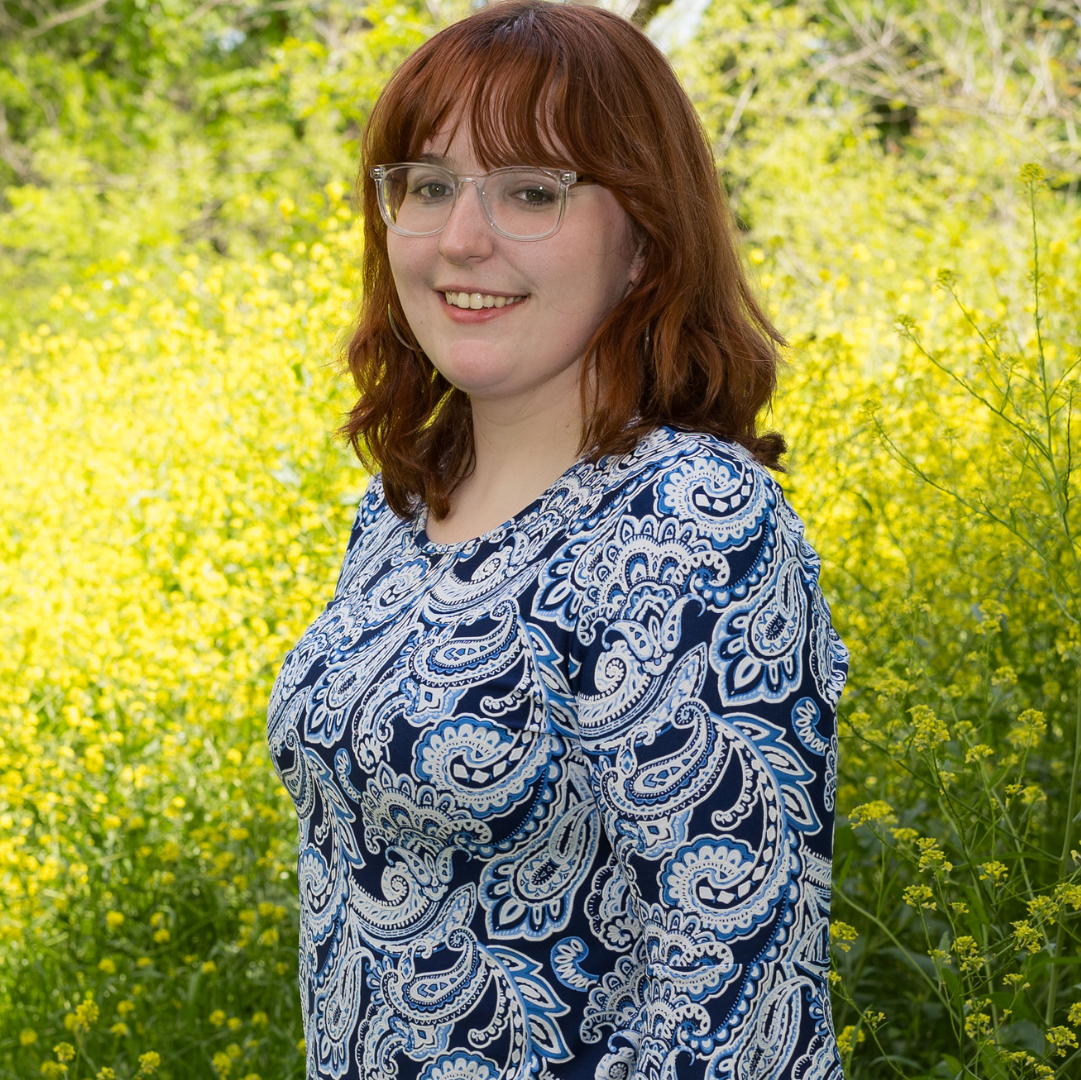
Brooke McPherson is TFN's Communications and Engagement Associate, and works across the intersections of communications, membership and data management at TFN to build connections, expand learning and deepen engagement across our network.
Highlights from the 2024 Smart Growth California Funder Summit | Cross Post
Smart Growth California is an initiative of The Funders Network. Ron Milam, the Director of Smart Growth California, wrote about his experience at the 2024 Funder Summit in Sacramento.
BY Ron Milam, Smart Growth California
We’re thrilled that over 70 people joined our Funder Summit in Sacramento, and excited to witness the sparks that ignite when new people meet and longtime colleagues see each other again.
We started with a welcome from Dion Cartwright, The Funder Network’s new President and CEO. She shared TFN’s work to center racial equity, focus on community, develop leaders and connect changemakers (Smart Growth California is an initiative of TFN).
We then engaged in a high-level overview of where California stands in addressing its climate goals. The conversation was particularly meaningful for us since Smart Growth California got its start 15 years ago in the wake of landmark legislation that set these climate goals. Numerous leaders engaged with ClimatePlan network joined us for this discussion and provided their insights.
We know that not everyone in our funder network directly funds transportation, land use and climate policy. But we felt it important to start with a deep look at these issues since they directly impact health and equity outcomes.
Read the full post on Smart Growth California’s website here.
Claiming the Future: A Conversation on Futurism and Philanthropy
The Funders Network is committed to sharing the stories and strategies of our members, partners and others in the philanthropic sector working to create more sustainable, prosperous and equitable communities. Today, we're sharing a guest blog post from TFN member Robert Wood Johnson Foundation (RWJF) highlighting a recent conversation between Trista Harris, President of FutureGood, and Jessica Clark, Founder and Executive Director of Dot Connector Studio, about the work of professional futurists.
Over the past five years, both have served as “futurists in residence” at RWJF, working with the Pioneering Ideas for an Equitable Future team to help spot signals and trends relevant to health equity. (We also featured Trista in our April TFN webinar How to be a Future-Focused Leader...Now.) Their conversational interview focuses on Jessica's professional development as a futurist and her thoughts around foresight in the social sector.
BY Trista Harris, FutureGood, and Jessica Clark, Dot Connector Studio
Trista: Thank you for agreeing to have this conversation with me. I appreciate your willingness to chat about your thoughts about futures-thinking as it relates to philanthropy and the nonprofit sector. I have just got a handful of questions. But first I want to hear a little bit about your futurism journey. So, how did you get interested in it?
Jessica: Oh, I have been interested in futurism since I started reading science fiction with my dad back in the ‘70s. And then I wrote a Master’s thesis in the early ‘90s on the role of women in cyberpunk literature and what those representations told us about the way the new public sphere was emerging. That was back before the internet had pictures!
Since then, I’ve kind of been ping-ponging between these three topics: public sphere, science fiction, and emerging technology. That has been my career for the last two decades
Trista: I love it! I have met so many folks who have come to futurism via sci-fi. I mean, that is the space where people are imagining what the future looks like. And I think it is such a good grounding, because they are great at creating a picture of what the future could look like: good or bad. There is a lot of bad…
Jessica: Right
Trista: But lots of folks are working on good versions of the future as well.
Jessica: Correct.
Trista: So tell me about your Futurist in Residence role at the Robert Wood Johnson Foundation. What have you been working on? What have you been doing?
Jessica: Well, the role actually sunset for me a few months ago. Currently, they have a Speculative Fiction Writer in Residence, Karen Lord.
Trista: I didn’t know that! That’s amazing!
Jessica: But I’m still working with them to try to understand the funding that they have been doing in the futurism space. They are really interested in this concept of “democratizing the imagination of the future”. Trying to bring in many different voices, and perspectives, and specializations to the question of how to achieve health equity. Then, I’m working a little bit with the communications team. They have tools like the Share Your Hunch site, which allows people to come in and submit their hunches about what they are seeing, feeling, or noticing as a way to incentivize open idea generation.
Trista: I love it. And, this is not your first time partnering with philanthropy. So, tell me how it was different to be sort of in the futurism team in a foundation as opposed to, what I lovingly call myself, “the weirdo from the outside” who’s like, Care about the future!
Jessica: [Laughing] Indeed, “the weirdo from the outside” is my middle name. So, yeah, it was great to be embedded in a team that is really devoted to innovation and very experimental and trying constantly to not only spot new trends, but also to understand the different ways that people operate in the world— from art to organizing to literature to…you-name-it! Trying to really bring all these different inputs into weekly meetings. They have an Ethicist in Residence, too. So talking about the social dimensions of futurism and innovation, which I think is pretty unusual. A lot of futurism is very corporate, or very instrumental and government-focused.
And also the grantees are just amazing. Because the team has an open portal that allows people to apply from a very broad array of spaces about projects related to the future of food, work, evidence, and other topics. They are all very different and they are all really working in whatever field they are inhabiting to try something new. So, it’s a super-lively, almost salon-like environment
Trista: I love that. And then you were a part of one of our 2023 FutureGood Studio cohorts. It was fantastic to have your expertise in that space and that was really appreciated by other participants. Can you tell us a little bit about your experience in that cohort? What were some highlights for you?
Jessica: I thought it was very thoughtfully designed. There were a lot of nice little touches, like you sent out a package for all of us to make tea together and just sort of have a virtual social hour. There were a lot of nicely designed materials. It was really well put together, especially for people who are new to the space and might find it intimidating. And you had an interesting cross-section of practitioners from non-profits, philanthropy, and other social good endeavors. So, it wasn’t just similar pathways people were exploring; there were various ways to incorporate these concepts into their lives and their work. And there were a few things…I mean, I have read a lot of futurism books [laughing]...
Trista: [Laughing] Yeah!
Jessica: So, I was familiar with some things. But there were also a few things which stuck with me. One was the idea of skipping the problem, both for mental relief and to generate creative solutions.
Trista: Mmm hmm.
Jessica: Which is very hard for those of us who are problem-focused! [Laughing]
Trista: Yes!
Jessica: To think about what if the world were actually what we had been fighting for this whole time. What would we do then?
Then the other one is thinking exponentially, which I always have a hard time with — even though I have witnessed just tremendous exponential change over the course of my career and, of course, all of our lifetimes.
Trista: [Laughing] Says the person who referenced “the internet without the photos,” so yes, you’ve seen it!
Jessica: I wonder if it’s almost a gender training or, maybe a non-profit mindset to not think exponentially, to be kind of humble.
Trista: Yeah.
Jessica: Whereas our world is actively changed all the time by people who are heedlessly thinking exponentially without any regard to the impact on other humans. So, those of us with some sort of a mission need to learn to do that as well — not just leave it up to the Elon Musks of the world.
Trista: Yes. I think you’re right. Like, this idea of don’t look at us, we’re just doing little things over here, both as a gender thing and as a non-profit sector thing of, like, don't put your head up too high because it might make people nervous about the work you’re doing. So everything winds up sort of under the radar. And that is not how you solve big problems!
So, how do we get out of that space and really claim the future we want to create? As opposed to constantly responding to the Elon Musks of the world and going No, not that! Oh my God, please not that!
Jessica: Non-profit work is gap-filling work. It is also bringing-people-up-who-don't-have-resources work.
It often tends to be, even if it is replicable, small scale or marginal, by definition. So how do we use some of the positive aspects of art and fiction writing and the most audacious activist visions we can tap into to think not just about fixing the problem, but also actually enjoying our lives?
Stuff like thriving, you know, doing things that are beyond the bare minimum or beyond the gap being filled, as if it were some road surface we were repairing.
Trista: I used to run a social justice foundation and when Obama was elected, everybody’s strategy had been fighting against. And, so, then he was elected and the strategy remained fighting against. And I was like, You know the person that, like, runs this federal agency — call them and tell them what you want! They are trying to partner with you! And, we’ve lost that ability - to build instead of stopping things from being built.
It is really beautiful when people have a picture of the future that they want to create that is equitable and serves people well. Like, Talk about that. That’s the piece that I think has really been missing in the sector.
Jessica: Yeah, I agree. I mean everyone right now of course has their heads in the election. And that not only is very short-sighted and very personality-focused, but it puts too much power into the hands of elected officials to shape what we feel is possible, to be more visionary and hopeful.
Trista: They’re not around long enough to create the long-term future that we need and, yet, we put in their hands, like, What’s it gonna look like for my grandchildren? And they are like, I am totally focused on this media cycle. [Laughs] It’s completely broken - what we need for the long term future.
So tell me a little bit about why a foundation leader should build their futurism skills? Why should they care about the future?
Jessica: There are different reasons. One is what we just said, they need to get out of the news cycle and the crunch and the panic and the crisis. To move out of reactivity and into creativity.
Trista: Mmm hmm.
Jessica: Also foundations have luxury, they can set a long term agenda if they want. They might have to answer to their boards — but there are relatively unfettered roads in front of them if they decide that they want to be leveraging things to affect long-term, generational futures.
Also, it’s just refreshing. Being a funder is a weird identity — people are constantly gnawing at you with their needs or their perspective on what the thing is and how you should solve it. It’s just nice to be able to take a step back and say, What are we really trying to do here? What do we really want here? Especially with your grantees or with your community — that would be the way to do it. It is not always to be in the funder-grantee mindset but to be really thinking about the end users.
Trista: Yeah. I love it. I love it!
--
About the Authors
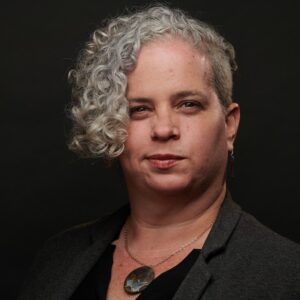 Jessica Clark is a futurist focused on media, culture and democracy, and the founder/executive director of Dot Connector Studio.
Jessica Clark is a futurist focused on media, culture and democracy, and the founder/executive director of Dot Connector Studio.
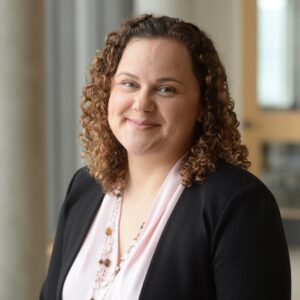
Trista Harris is a Philanthropic Futurist and President of FutureGood.
Header: Photo by PIRO4D is licensed under CC BY-NC-SA
Going PLACES: Love as a Force to Dismantle White Supremacist Systems
BY Maria Aquino, Senior Program Officer on the Priority Communities Initiative at The James Irvine Foundation, and 2023 PLACES Fellow
During the third PLACES site visit, our cohort ventured into the Southwest to Santa Fe, N.M. In the PLACES tradition, our first day provided some foundational context about the city, which was led by City of Santa Fe historian and author of Environmental Justice in New Mexico, Valerie Rangel. Valerie used an innovative community-informed ArcGIS Storymaps tool to walk us through the region’s history using images and narrative. We learned a more accurate storytelling of the multiple invasions and genocide this part of the country has experienced, and the many faces of white supremacy that continue to be glorified with bronze emblems memorializing the ideology of colonization. Yet, the region’s history began long before any Europeans brutally claimed rights to its land, and situating the story with Indigenous people at the vanguard is an act of resistance and liberation that Valerie intentionally located within the timeline and geography of the story maps.
The mural in the picture, which celebrates colonialism, adorns the walls of the St. Francis Auditorium at the New Mexico Museum of Art in Santa Fe. Fellows learned about local efforts to foster a collaborative creative community and
support people, ideas, and art forms that are underrepresented in Santa Fe's art scene.
Despite its history, Santa Fe has also been the setting of survival, resilience, culture, and healing, particularly within its Tribal nations. That is what the PLACES journey has shown us overall, as we have journeyed to various battlegrounds where the forces of racism are fought by everyday heroes who are building a future of solidarity and belonging. Santa Fe was no different, and during our trip we met with foundations and nonprofit partners working to shift power, build multi-racial solidarity, promote radical inclusion, and honor Indigenous sovereignty.
Changing Philanthropy & Trusting Indigenous Leaders
After our historical grounding, we ventured outdoors to the Glenn Green Galleries. In the garden we were surrounded by sculptures and pine trees, where we heard from James Calabaza of Trees, Water, People, JoAnn Melchor, CEO of the New Mexico Foundation (NMF), and Garrett Altmann from the Environmental Policy Innovation Center (who partners with the Santa Clara Pueblos.) JoAnn shared that despite having over 20 years of experience in nonprofit work, her leadership was questioned from the start, which is demonstrative of the change that is still needed in philanthropy to trust leaders of color. JoAnn understands that being from the community means she is not only accountable to the foundation, but more powerfully to her own community. Trusting leaders of color can create transformational change, especially when they in turn trust and implement the solutions generated by communities that experience the systemic inequities philanthropy seeks to address.
When JoAnn joined NMF as CEO, she demonstrated early on that being from the community meant she would bring significant changes. At the onset, she convened all the Tribal nations in New Mexico to hear how they reimagined partnering with the foundation. NMF practiced trust-based philanthropy, designating funding to implement community-identified priorities. They onboarded Indigenous woman-led, Roanhorse Consulting and formed a grant review committee comprised of community members. On the administrative side, they decreased grant proposals to one or two pages and shifted to culturally responsive reporting, such as poetry, video, and storytelling. These culture and practice changes put power back in the hands of grantees so that they could focus on the transformative work they do daily.
Culturally Affirming Philanthropy
As a queer Latine woman of Indigenous ancestry, our second day was one of my most culturally affirming experiences in philanthropy. A panel highlighting the LGBTQIA2S+ community shared their advocacy and movement building efforts in the state. We met co-founders of Indigenous Ways, Elena Higgins and wife, Tash Terry, who set the tone with a song about Indigenous wisdom about what connects us to each other. They spoke about the power of love as a force to disrupt systems, serving as an antidote to hate and division, while promoting healing. Indigenous Ways educates people about certain ancestors’ views that recognize 5 genders and see queer people as healers. We also heard from T. Michael Trimm, executive director at the Transgender Resource Center of New Mexico, who practices intersectional equity by uplifting trans, nonbinary and gender nonconforming people through advocacy, direct services, and trans cultural fluency education throughout the nation.
PLACES Fellows met with local leaders from the Pueblo of Santa Clara, Trees Water, People, and New Mexico Foundation to
learn how trust-based philanthropy can create a rebalance of power when engaging with Indigenous communities and honoring Indigenous sovereignty.
We then joined a panel of artists of colors, Rashaan Ahnad (Vital Spaces & Earthseed Black Arts Alliance), Israel Francisco Haros (Alas de Agua), Ehren Kee Natay and Gabriela Gomez, senior director of Meow Wolf Foundation. The artists opened up about the challenges of being artists of color in the region, where inclusion can be performative, and racism often limits their access to funding. In sharing their stories, I could see how distressing these experiences of exclusion are, as the artists contend with the rising cost of housing and gentrification, making it hard to stay in Santa Fe. Paradoxically, we also heard about the hardship of being a funder with limited resources dedicated to supporting artists of color, despite intending to resource the work more holistically.
Israel articulated the complex environment they navigate as one in which three forms of white supremacy are persistent; white supremacy, liberal white supremacy, and white Hispanic supremacy (which allies itself with Spanish European colonizers). There was a turning point in the conversation when a PLACES Fellow named the tension between the artists’ struggles and philanthropy’s space of privilege where funding often excludes them and goes to larger art institutions. Acknowledging this inequity allowed us to shift into a more honest conversation about how philanthropy has perpetuated white supremacy and further marginalized BIPOC artists. In a space of truth telling and authentic listening we stepped into bearing witness to the damage that unbalanced power dynamics in philanthropy has caused.
Racism and Healing
Throughout the Santa Fe trip I sensed a likeness to my only previous visit to the Southwest as a teenager, when our family caravanned to Guadalajara one summer. We drove from California through Arizona, New Mexico, and Texas before crossing south of the border. While passing Arizona, a white man yelled at me and my cousins, “Go home wetbacks.” He used the derogatory term for people who cross the Rio Grande to the U.S. My cousins, who are half Navajo, yelled back expletives at the man letting him know he was the one on foreign land. Though I felt vindicated by my cousins’ response, that experience colored my view of the Southwest. In Santa Fe, no one yelled at me to “go back home,” but I still got the message, just as I did in Arizona long ago, that people who look like me are not welcome.
Even so, I am fully aware that anti-Indigenous and anti-Black racism is not unique to the Southwest, without a doubt it is white supremacist ideology that led to the creation of this country and shaped its systems. This is systemic, yet it is also personal, and it saddened me to reflect on the anti-Indigenous racism I’ve experienced in my own life, within my own culture and family. Colorism, rooted in white supremacy, has created profound wounds, and led many in my family to reject our Indigenous ancestry. Perhaps there was a time when it was necessary to survival, because of the violence of colonization, yet the hurt has continued for generations. White supremacist culture makes its way into every part of our lives, no matter where in this country we reside, and without acknowledging it, old wounds continue to run deep, and new ones get created. While there is still much work needed to dismantle white supremacy within systems, I felt the gravity of the simultaneous work needed to heal from its harms.
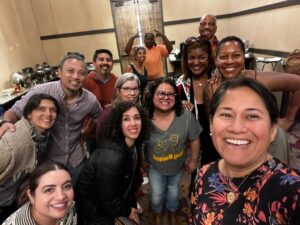 PLACES Fellows celebrating another great week of learning at the end of their visit to Santa Fe.
PLACES Fellows celebrating another great week of learning at the end of their visit to Santa Fe.
Santa Fe showed me that while racist sentiments are pervasive, there are leaders who are using art, song, storytelling, and cultural practices for healing and to create spaces that celebrate diversity, center racial justice, and build power. As we concluded our trip, Bina Patel left us with our ongoing assignment in philanthropy: to continuously reflect on how we are present for someone else’s grief, bear witness, and stand in solidarity. Philanthropy can be a difficult space to occupy, but within it we hold power and privilege that should be shared and relinquished to communities. Through PLACES we have been in community, among our fellows and the bridge building leaders we’ve met along the way. As we journey back to our offices, we are called on to use philanthropy for good by bringing more heart to the work and make progress towards liberation. For this I take with me the message that Elena and Tash offered, that love can be an antidote for division and a force for changing systems.
About the Author
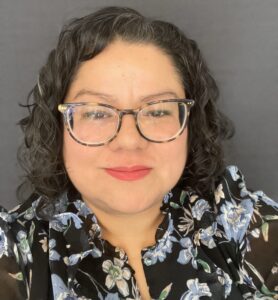
Maria Aquino is a senior program officer on the Priority Communities Initiative at The James Irvine Foundation, focused on supporting a local economy that works for all by increasing access to quality jobs and ensuring community voices drive economic development. Maria is a member of TFN's 2023 PLACES Cohort.
A Reminder to Be Bold and Courageous Leaders
This post originally appeared in the PLACES Connection December 2023 newsletter.
BY Dion Cartwright, Director of Equitable Initiatives and Leadership Development and Incoming President and CEO
As I reflect on the last seven years at TFN and what journey lies ahead, I become full of gratitude and heartfelt appreciation for the people that I’ve had the pleasure of being in community with over the past seven years. I have gained some of the most amazing friendships, visited beautiful cities, learned from leaders across sectors and worked to advocate for and address some of the most pressing issues of our time.
I also got to be a witness to the brilliance and resilience of the many people we’ve been honored to meet that fight for true change in the face of adversity. Our travels introduced you to opportunities to hear from community and nonprofit leaders to learn about the atrocities they face and their local and regional efforts to confront them head on.
In states like West Virginia, where issues of addiction and poverty are at the forefront, healthcare issues in rural Kansas, or major climate issues that impact Indigenous communities in Standing Rock, North Dakota.
We also bore witness to the the immigration challenges faced by boarder communities in El Paso, and the water crisis impacting people in Flint.
Even recent attacks on our democracy and the constant pain and suffering facing people here in the U.S. and beyond, there were no shortage of challenges communities faced. There was, however, a shortage of courageous and systemic actions philanthropy had taken to address them.
What makes PLACES such a special program is our willingness to unpack the hard truths about the individual, institutional, and racial inequities that exist within the philanthropic sector and the systemic inequities communities are facing every single day. There is a willingness that participants have had to address these challenges in their grantmaking and engagement efforts. A willingness to be bold and courageous in efforts to dismantle systems of oppression while at times being challenged with our own strategic complicity as we navigate personal truths, our own safety, and even the realities of our own identities and journeys that influence who we are and our approach to the work.
The work doesn’t stop there. This note is a reminder to each of you to never forget the power you hold to influence change, create a bold, unobstructed vision and new approaches to this work. Think about what you can do from your position of power and how you might bring others along in your effort to change the world.
As someone who has committed their career to investing in people, communities, and intergenerational leadership, I am honored that TFN has chosen me to not only lead the organization into its next chapter, but also to advancing our mission and creating a home for philanthropic changemakers like yourselves, working to create more just, sustainable, prosperous, and healthy communities for all. The opportunities I see ahead for TFN, and the sector excites me, and it continues with each of you. Each one of you represents an opportunity for us to collectively be BOLD and COURAGEOUS in our fight for JUSTICE. I hope you continue to join me in helping philanthropy live up to its name. #NoMoreFuckery
About PLACES
PLACES — which stands for Professionals Learning About Community, Equity and Sustainability — uses learning, coaching and reflections to explore structural racism, community empowerment and equitable grantmaking practices. In addition to the PLACES curriculum, Fellows learn from the people and places we visit. Our Fellowship Cohort, selected annually from a highly competitive pool of applicants, embarks on year-long journey that includes four site visits to communities across the U.S. and Canada.
The PLACES Fellowship concludes with a capstone presentation and graduation — but that rarely marks the end of the PLACES experience. As any PLACES alum will tell you, the deep bonds and professional connections forged by the Fellows extend well beyond the end of their cohort year. Learn more about the PLACES fellowship and alumni here.
Applications are now open for 2024 TFN PLACES Fellowship. The deadline to apply is Jan. 5, 2024. View the application and apply today!
About the Author
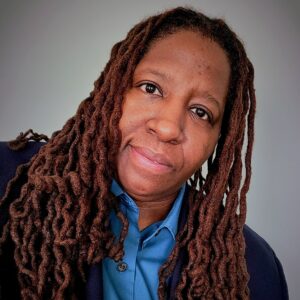 Dion Cartwright is TFN's incoming President and CEO. Prior to CEO, Dion served as senior director of equity initiatives and leadership development, where she directed the PLACES Fellowship program and lead the organization’s work to address equity, inclusion, and structural racism. She was a 2010 PLACES Fellow and chaired the PLACES Advisory Board for four years before joining TFN’s staff.
Dion Cartwright is TFN's incoming President and CEO. Prior to CEO, Dion served as senior director of equity initiatives and leadership development, where she directed the PLACES Fellowship program and lead the organization’s work to address equity, inclusion, and structural racism. She was a 2010 PLACES Fellow and chaired the PLACES Advisory Board for four years before joining TFN’s staff.
PLACES 2024 Fellowship Applications Now Open!
We know that philanthropy attracts people who care deeply about creating positive change. But we also recognize that funders often face obstacles in turning ideals into impact — especially when faced with the prospect of untangling decades of systemic inequities that have caused grievous harm to our most historically marginalized communities.
The good news for people seeking to do good work: You don't have to go it alone.
Applications are now open for TFN's PLACES Fellowship, an eight-month learning journey designed to help grantmakers embed the values and practices of environmental, economic and racial justice into their work. The EXTENDED deadline to apply is Jan. 10, 2024. View the application and apply today!
PLACES, which stands for Professionals Learning About Community, Equity and Sustainability, cultivates and connects leaders passionate about addressing a wide range of issues — such as the escalating climate crisis, barriers to opportunity, the erosion of civil liberties and legislative assaults on bodily autonomy.
Regardless of their grantmaking portfolios, PLACES Fellows are equipped with the tools needed to understand, challenge and change systemic inequities, and translate that learning into meaningful action and impact.
PLACES not only benefits those individual grantmakers, but enriches their institutions and the field of philanthropy as a whole.
We encourage you to apply for the PLACES Fellowship if you’re looking to:
- Expand your understanding of systemic racial, social and economic inequities and their impacts on policy, culture, communities and climate.
- Acquire the tools and resources to embed the values of equity and justice in your work as a grantmaker.
- Explore and challenge your own biases and blind spots, regardless of your background, about who you are and how you create change.
- Forge deep connections with other leaders in philanthropy who are deeply committed to shared learning and collaboration.
Invest in your personal and professional leadership growth. - Tap into the resources and opportunities as a member of the PLACES Alum Network, including alum-only learning sessions, networking events and digital platforms.

About the PLACES Fellowship
The 2024 PLACES Fellowship will be an in-person experience, although we recognize that the ongoing COVID-19 pandemic may require us to be flexible.
Key 2024 Fellowship Dates*
- May 13-17: Cleveland, Ohio
- July 10-12 :Denver, Col.
- Sept. 18-20 - Toronto, Ontario, Canada
- Nov. 13-15: Sacramento, Calif.
*Dates are subject to change.
Fellowship Fees
For accepted participants, the following fees will apply:
- TFN Members: $750
- Non-members: $1,250
Fees help support the programmatic and operational costs associated with the fellowship, including but not limited to, speaker honoraria, facilitator fees and group transportation. Fellows will be responsible for travel costs and hotel accommodations for site visits. (Limited travel sponsorships will be available to offset travel costs and are subject to availability.)
Find Your People: PLACES Alum Network

2023 PLACES Fellows at their site visit to Detroit.
The PLACES Fellowship is one of TFN’s most significant efforts to foster courageous philanthropic leaders who are engaged, emboldened and equipped to bring about meaningful change. Over the past decade, PLACES has welcomed more than180 leaders in philanthropy committed to deepening their understanding of environmental, economic and racial justice. Translating those skills into practice has taken on increased urgency as we face overt efforts to undermine the values of diversity, equity and inclusion in our libraries, classrooms, college campuses and other areas of civic life.
Now, more than ever, we need bold leaders in the philanthropic sector who can serve as ambassadors and advocates for justice.
By becoming a PLACES Fellow, you’ll have opportunities to continue your learning and connect with peers in the sector through the PLACES Alum Network. This amazing network is comprised of alums from all corners of the United States and Canada, representing national, regional, family, corporate, and community foundations as well as philanthropy serving organizations and other funding institutions.
Recent cohorts have addressed issues impacting disenfranchised communities, including structural racism, gender justice, health equity, environmental sustainability, economic development and community engagement — asking difficult questions and exploring uncomfortable truths along the way.
→ Meet the 2023 PLACES Fellows

What We've Learned
Earlier this year, we retained an outside firm to conduct a comprehensive evaluation of the PLACES Fellowship and Alum Network. The results reinforced our commitment to creating a space for funders to come together to find inspiration, solidarity and shared purpose, both during and after their PLACES Fellowship experience.
Some key findings shared by the PLACES Alums surveyed:
- 81% reported increasing grants to organizations led by and serving people of color.
- 83% said PLACES help them better connect sustainability issues to racial justice.
- 86% of surveyed alums reported advocating for more equitable practices
- 95% of surveyed alums said PLACES provided them with skills, tools, and resources to advance practices that promoted equity in their organization.
- 93% of surveyed alums said PLACES provided them with skills, tools, and resources to advance practices that promoted equity in their grantmaking.
- 92% of surveyed alums said PLACES helped them better understand the culture of white supremacy and how it shows up in philanthropy.
What We're Sharing
After each PLACES site visit, we ask the Fellows to reflect on their experiences in our blog series Going PLACES. Check out some highlights from our PLACES alums:
- Going PLACES: Fostering a community for youth in Detroit | Monae Dale, Program Manager, Housing & Economic Opportunity at the California Community Foundation, and 2023 PLACES Fellow
- Going PLACES - Trading Palm Fronds for Maple Leaves: What Two Demographically Distinct States can Learn from Each Other | By Xan Avendaño, Program Officer at The Harry and Jeanette Weinberg Foundation and 2022 PLACES Fellow.
- Going PLACES: What the Newark Rebellion can teach us about Philanthropy | By Grace Chung, Senior Community Development Officer, LISC New York City and 2019 PLACES Fellow.
- Go Deeper: For the 10th anniversary of TFN’s PLACES Fellowship, we asked PLACES alums to share what inspires, motivates and challenges them in their efforts to embed the values of racial, social and economic equity into their work. The result was PLACES X: Stories of Impact, which includes essays and videos. Explore the full multimedia project here.






